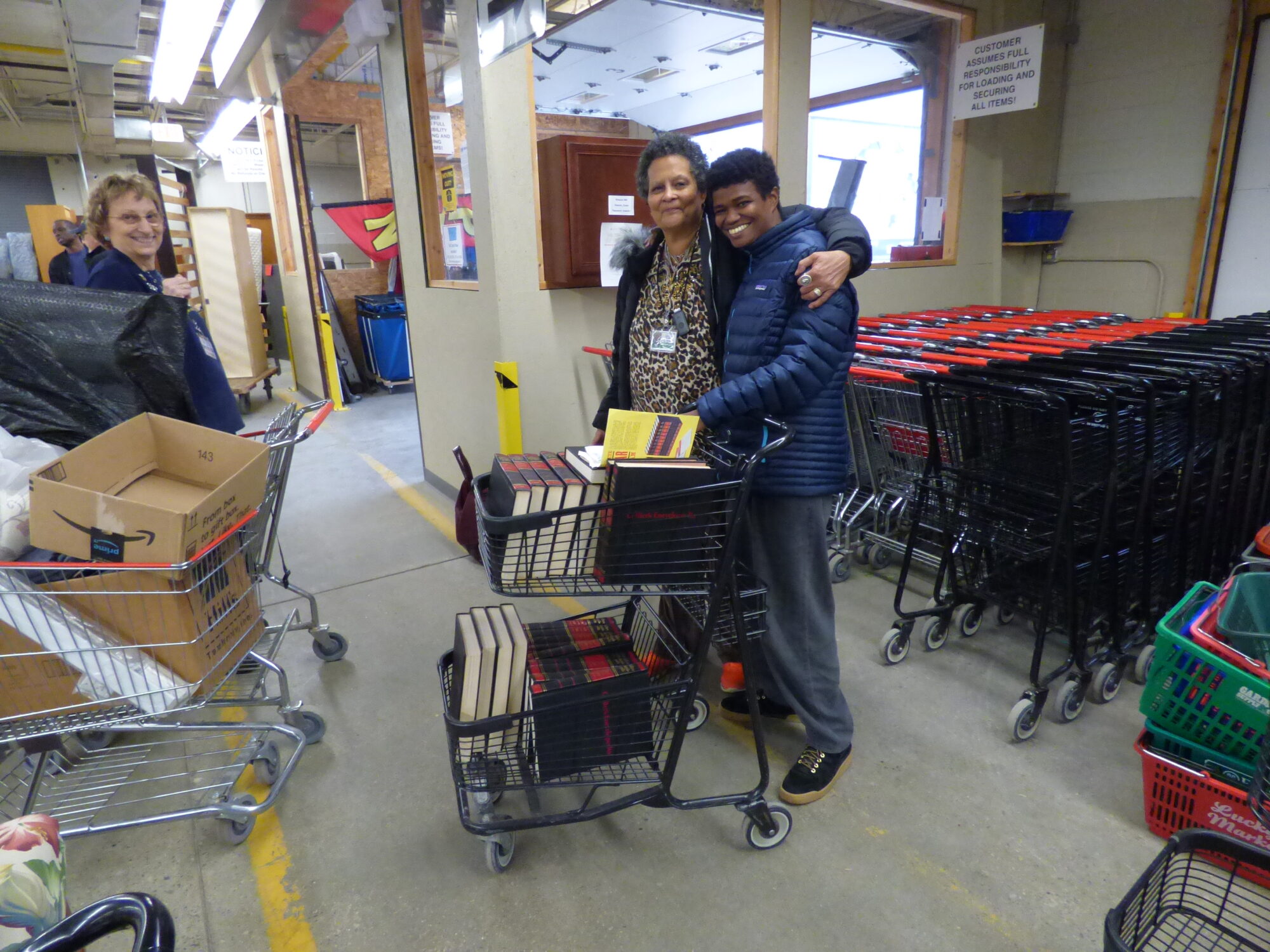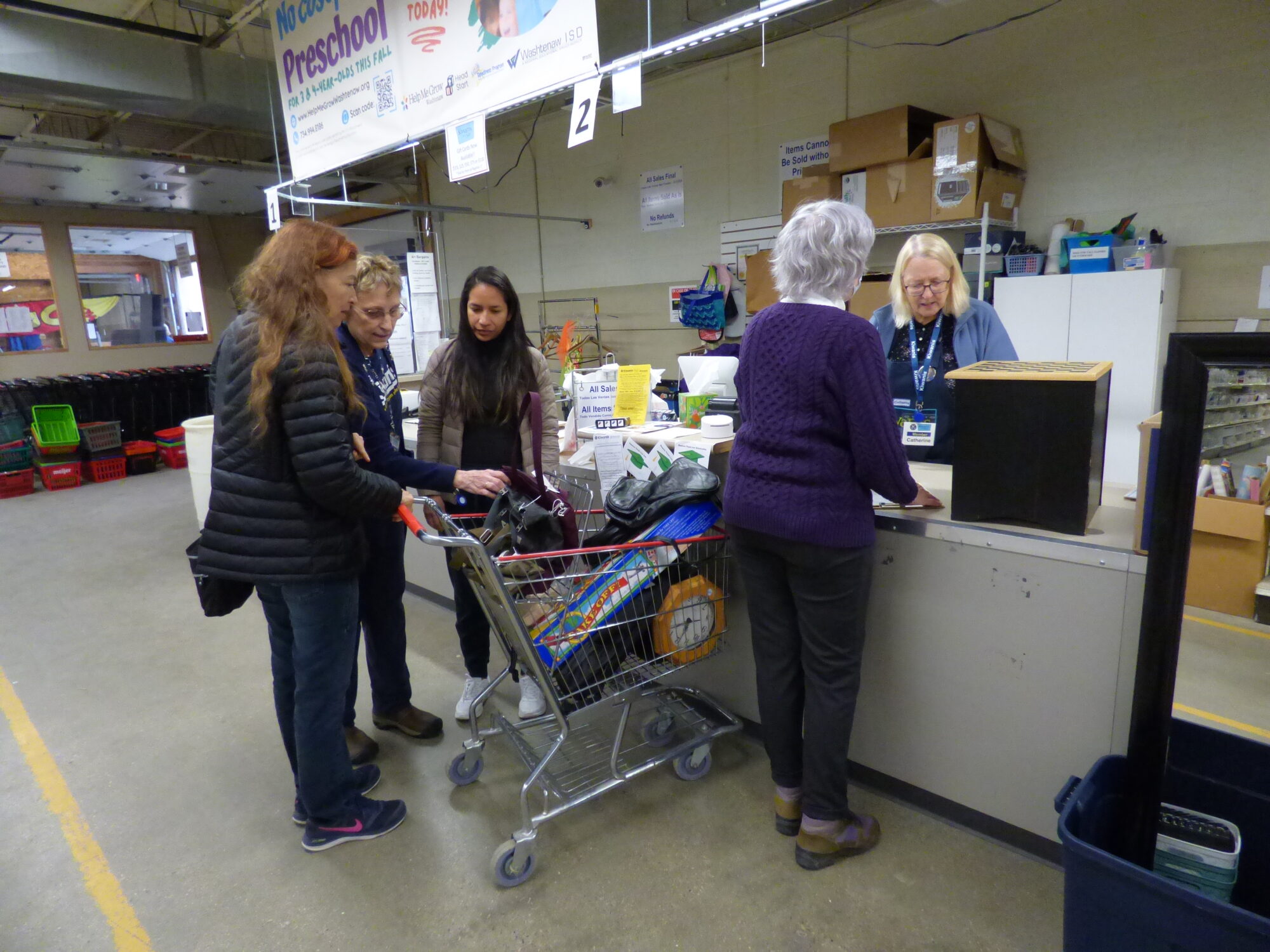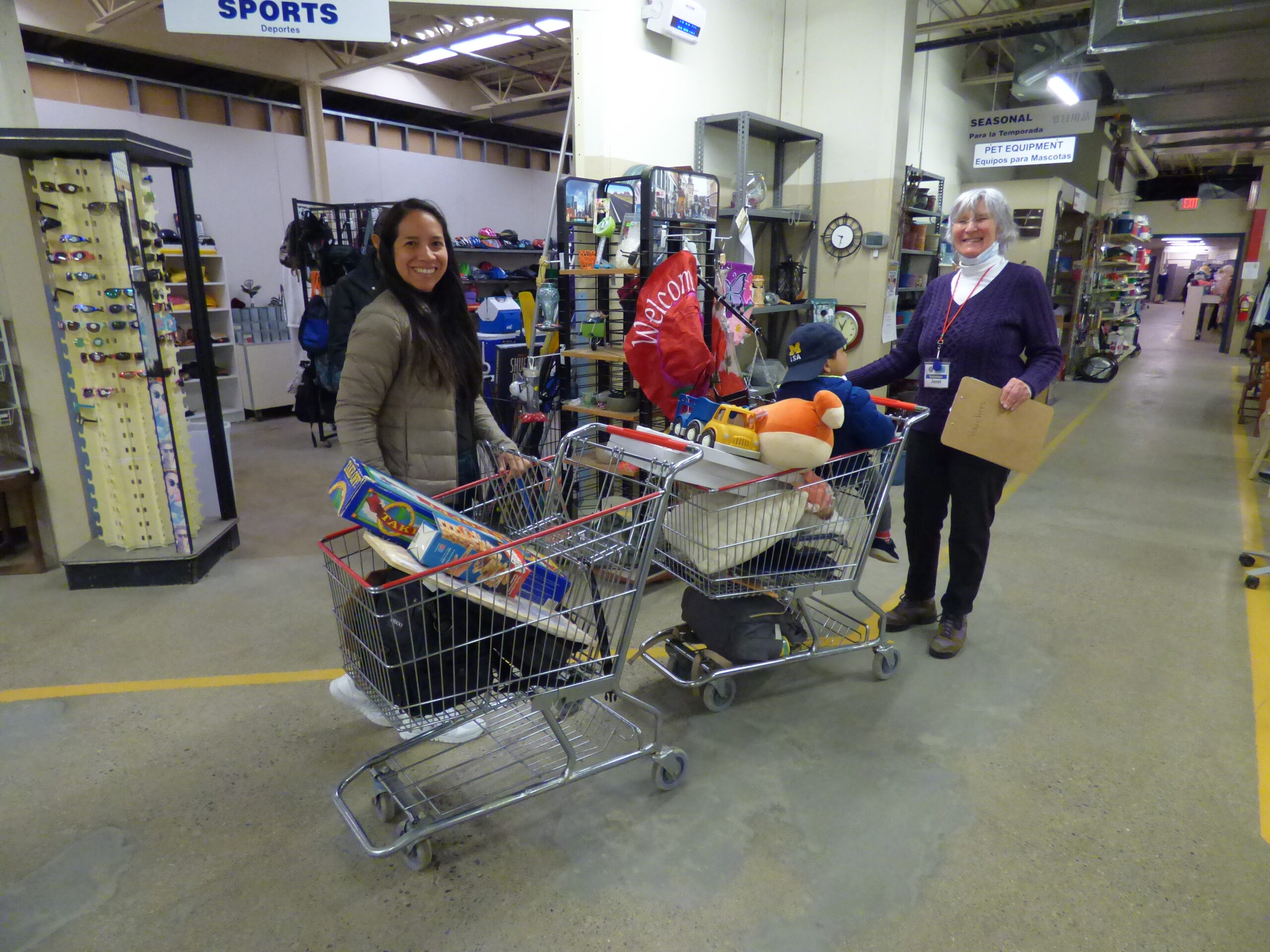Every Thursday, Kiwanis volunteers help families in need furnish their homes for free, offering dignity, hope, and a fresh start in Washtenaw County.
On a blustery winter Thursday, clusters of excited shoppers, accompanied by Kiwanis volunteers and flatbeds, tour the Kiwanis Thrift Sale showrooms, searching for everything a home needs: microwaves and mixers, tables and chairs, beds and bedding, couches and cooking utensils. Within two hours, they are able to start—or restart—a new life.
Those shopping trips don’t cost the shoppers a cent. This is Kiwanis Voucher Day.
“Throughout the year, Thursdays are devoted to providing items free of charge to members of our community who have hit rough times,” says Debbie Ryzdon, chairman of the voucher operation. “This is a feel-good program like no other.”
“We are seeing the needs within our community skyrocket since Covid,” adds Peter Schork, a thirty-year Kiwanis member who supervises the intake of weekly donations. “Fortunately, our Thrift Sale proceeds have also grown accordingly. Kiwanis is giving more to agencies and individuals than ever before.”
Running Voucher Day is a five- or six-days-a-week job for Debbie Ryzdon, who first visited the Thrift Sale showroom six years ago, soon after she moved to town. Her career as a Kiwanis volunteer began when her cashier told her, “We need volunteers.”
Ryzdon volunteered for four years, and when she became a club member in 2022, she accepted the job of overseeing the entire voucher system. Her responsibilities range from handling a hefty budget to working with local social service agencies, training social workers and volunteers, conferring vouchers, and hosting shoppers every week.

It’s a huge job. Last year, the Thrift’s sales figures topped $2 million, and as the sales have grown, so have voucher program responsibilities. Ryzdon is swamped with emails and correspondence from local service agencies, social workers with needy clients, and volunteers. She schedules the visits and volunteers, then supervises Voucher Thursdays.
How to budget for voucher days
Two years ago, the club budgeted $100,000 for donations of household goods and clothing to needy neighbors. Last year, Kiwanis increased the budget to $130,000. This year it jumped again, to $175,000, due to increasing demands for help. In January alone, the voucher program distributed $53,000 in goods to people facing hard times.
Kiwanis has formed close connections with social service agencies within Washtenaw: Michigan Ability Partners (MAP), Avalon, Michigan Medical Center, Child Protective Services, Safe House, Alpha House, Dawn Farms (“their people are usually leaving drug rehab programs”), and the Washtenaw County Housing Commission and Health Department. Last year, the voucher program was extended to recently released prisoners—”but Safe House and Child Protective Services take priority, as well as anyone referred by the courts.”
After consulting with social workers about clients’ needs, Debbie calculates the appropriate voucher amount, which averages $250 for a family’s household goods. “If someone is thrifty, they can completely furnish an apartment with that.”
By nine o’clock on Thursday mornings, social workers introduce their clients to the volunteers who will escort them through the departments, loading items onto their flatbed as they go. The social workers know the needs, the volunteers keep track of the budget—“depending on the circumstances, we may exceed the voucher a bit, but you can ‘buy’ a lot for $250 here,” Ryzdon says.
Within two hours, as many as twelve families will leave the Thrift Sale with the start of a comfortable life.

The need for help is growing
But the demand for vouchers is now outpacing the volunteer staff, Ryzdon says. “Sometimes we have to schedule visits three or four weeks ahead, and we hear so many heartbreaking stories.” She recently worked with a woman who had barely escaped from her abusive partner and needed everything to start her life over again. “When she left the hospital, she didn’t even own a pair of shoes.”
Refugees are also arriving in growing numbers. The people who receive vouchers offer a glimpse into international affairs. According to Ryzdon, several years ago, Kiwanis helped settle Ukrainian and Eastern European refugees. Now, volunteers are seeing large numbers of refugees from Afghanistan, Syria, Sudan, and other Muslim countries.
Interestingly, their tastes in furniture and clothing are different from the average shopper.
“People from those regions love gold and sparkly things. They choose more elaborate furniture, fine china, and beautiful serving dishes,” Ryzdon says. “Instead of sofas, they buy pillows for the floor. And many women from those regions don’t like our clothing. They’ll choose fabric instead, so they can sew clothes for themselves and their children.”
In contrast, the bachelors who receive vouchers know exactly what they want: “one pan, one plate, one chair, perhaps a television, and no more,” she adds. “Either way, this job is very humbling. The voucher program offers Kiwanis our most direct impact on people in need. After an hour or two shopping in the Thrift Sale, I’ve had people crying, they’re so grateful.”
As the need for vouchers has grown, so has the need for volunteers. “A year ago, I was lucky to have Karen Jacobson come to me, offering to help,” Ryzdon says. “She is terrific: so enthusiastic and full of ideas.”
Doubling the number and impact of voucher days
Karen Jacobson joined to Kiwanis in 2023, after years of volunteer work at the Mercy House, Ypsilanti Peace House, and within the homeless community. She offered to split the voucher program in two and supervise clothing vouchers on Wednesdays, which means shoppers don’t have to shop for everything at once.
Jacobson can be found in the Thrift Sale every Wednesday morning, helping shoppers find appropriate clothing. “We had a family of ten arrive one Wednesday, and we fully clothed them for $498,” Karen says. “I’m a statistician and a lifelong thrifter, so I am always looking for bargains and looking ahead for future needs.”
Because Michigan has four distinct seasons, clients of social service agencies can shop for seasonal clothing every four months. To help recent refugees who prefer to make their clothes, she reached out to the community for donations of sewing machines and fabric.
She also adds free books to the carts of Wednesday shoppers. The book department averages 2,000 pounds of donations each weekend, and the piles mount to the very high ceiling, so the department head welcomed Karen’s suggestion.
“We’re here to help people as much as possible, in as many ways as possible,” Jacobson says.
A century-old tradition
The Thrift Sale has a long history in our community. Kiwanis Club of Ann Arbor was chartered on June 13, 1921, and six years later launched the tradition of an annual rummage sale to fund community outreach activities. Through the years, the rummage sale became the Thrift Sale, and its size, merchandise categories, and frequency ballooned. When Kiwanis purchased the 123,000-square-foot Sheridan Books property in 2014, the size and sales figures soared.
“Our vision statement inspires each of us to be exceptional in providing needed support to people, and every year we break records doing that,” Jacobson says. “We just ended a fiscal year that saw the Thrift Sale gross more than two million dollars in sales—$2,004,931, to be exact. This provided $1,609,033 in cash grants and goods to our neighbors and local service agencies.”





 8123 Main St Suite 200 Dexter, MI 48130
8123 Main St Suite 200 Dexter, MI 48130


